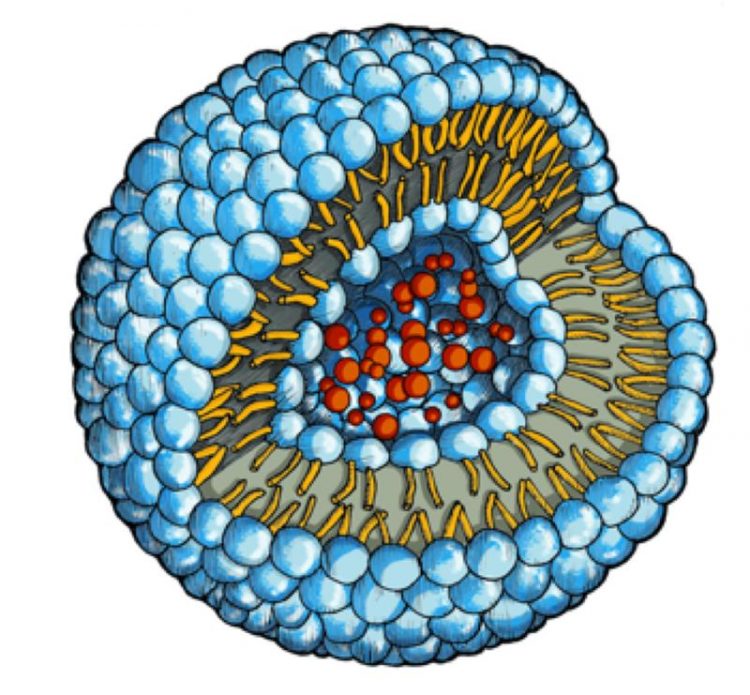Soap Bubbles for Treating Stenosed Blood Vessels

The drug molecules (red) are embedded in a water-filled cavity inside of the phopholipid vesicle. University of Basel/University of Fribourg
Liposomes are soap-bubble-like nanocontainers made of a double phospholipid membrane that shields off an inner aqueous compartment. In a lenticular form, as developed by Professor Andreas Zumbühl’s team at the Department of Chemistry at the University of Fribourg, they are promising candidates for drug delivery to constricted coronary arteries. Here, the blood flows through the stenosed artery segments with high velocity and is subjected to enhanced shear forces. Under these conditions, the liposomes open and release their content.
Unfortunately, the immune system does recognize these liposomes as foreign bodies. The activation of the immune system may lead to a pseudo-allergy. Earlier studies have shown that negative effects are found in up to 30 percent of the cases. Even using clinically approved liposomal dugs it is possible to find anaphylactic shocks, which can be highly toxic for the treated patient.
No Reaction in Pig Studies
A team of researchers led by Prof. Bert Müller from the Biomaterials Science Center of the University of Basel and Prof. Andreas Zumbühl from the Department of Chemistry at the University of Fribourg has tested artificial phospholipid vesicles (Pad-PC-Pad vesicles) for their potential as drug delivery nanocontainers. Surprisingly, these liposomes did not spur any reaction neither in blood serum of pigs nor humans.
In a next step, the vesicles were tested in living organisms. The researchers injected three Yorkshire pigs with Pad-PC-Pad suspensions and monitored the heart rate, the electrocardiogram and the blood pressures. Even at high doses the pigs showed no or negligible reactions. The biopsies of pig tissues showed no toxic changes in kidneys, lungs, heart, and liver. “The study shows that Pad-PC-Pad liposomes are not inducing direct or indirect anaphylactic reactions, even at high dosages”, says Professor Bert Müller of the University of Basel. “These are highly unexpected results could have a high impact of future treatments of atherosclerosis.”
According to the World Health Organization WHO coronary artery diseases are responsible for 30 % of deaths worldwide. In the case of constricted coronary arteries the conditions often gets worse during the transport of the patient to the hospital, showing the need for medication that efficiently covers the pre-hospital segment. Pad-PC-Pad vesicles therefore show high potential because, in contrast to existing liposomes, they do not elicit a significant immune response.
Original source
Simon Bugna, Marzia Buscema, Sofiya Matviykiv, Rudolf Urbanics, Andreas Weinberger, Tamas Meszaros, Janos Szebeni, Andreas Zumbuehl, Till Saxer, and Bert Müller
Surprising lack of liposome-induced complement activation by artificial 1,3-diamidophospholipids in vitro
Nanomedicine: Nanotechnology, Biology, and Medicine 12 (2016) | doi: 10.1016/j.nano.2015.12.364
Further information
Prof. Bert Müller, University of Basel, Biomaterials Science Center, phone +41 61 265 9660, email: bert.mueller@unibas.ch
Prof. Andreas Zumbühl, University of Fribourg, Department of Chemistry, phone +41 26 300 8794, email: andreas.zumbuehl@unifr.ch
https://www.unibas.ch/en/News-Events/News/Uni-Research/Soap-Bubbles-for-Treating…
Media Contact
All latest news from the category: Life Sciences and Chemistry
Articles and reports from the Life Sciences and chemistry area deal with applied and basic research into modern biology, chemistry and human medicine.
Valuable information can be found on a range of life sciences fields including bacteriology, biochemistry, bionics, bioinformatics, biophysics, biotechnology, genetics, geobotany, human biology, marine biology, microbiology, molecular biology, cellular biology, zoology, bioinorganic chemistry, microchemistry and environmental chemistry.
Newest articles

Properties of new materials for microchips
… can now be measured well. Reseachers of Delft University of Technology demonstrated measuring performance properties of ultrathin silicon membranes. Making ever smaller and more powerful chips requires new ultrathin…

Floating solar’s potential
… to support sustainable development by addressing climate, water, and energy goals holistically. A new study published this week in Nature Energy raises the potential for floating solar photovoltaics (FPV)…

Skyrmions move at record speeds
… a step towards the computing of the future. An international research team led by scientists from the CNRS1 has discovered that the magnetic nanobubbles2 known as skyrmions can be…





















